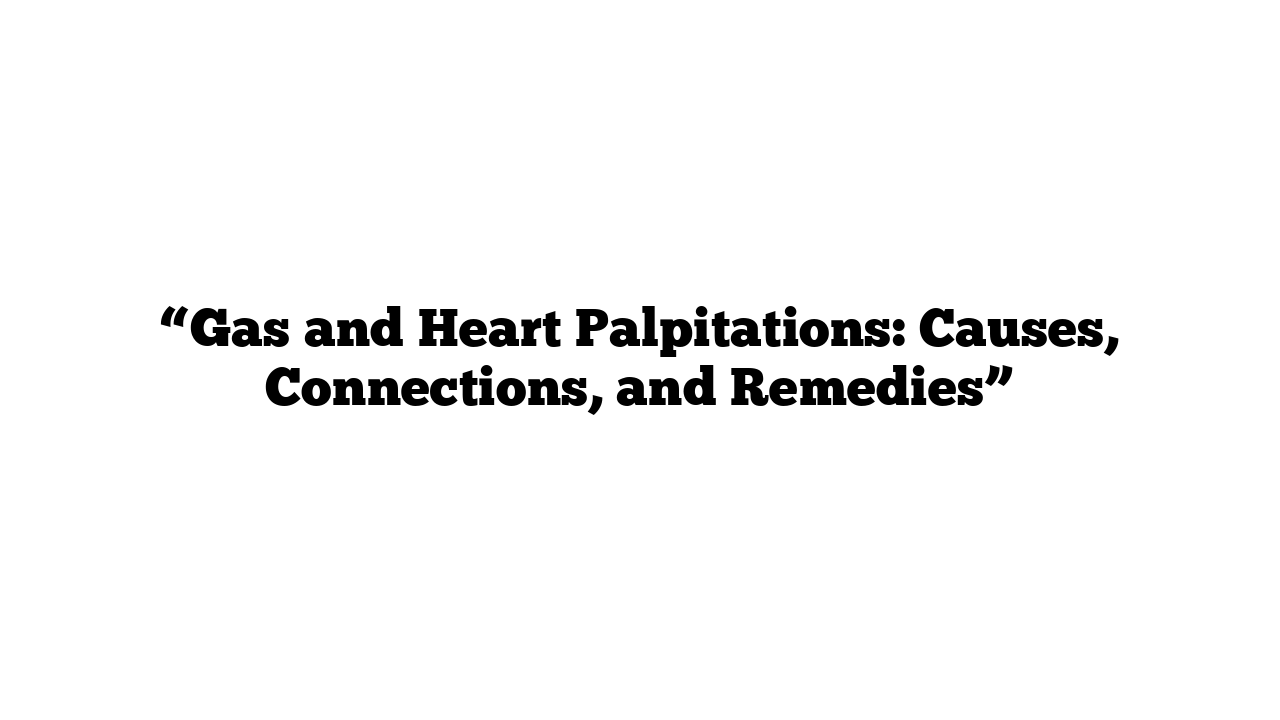Experiencing gas and heart palpitations together can be alarming. While these symptoms may seem unrelated, they often share a connection. Understanding the causes and knowing how to manage them can bring relief and prevent unnecessary worry.
What Are Heart Palpitations?
Heart palpitations are the sensation of your heart beating irregularly. This may feel like:
- A fluttering sensation.
- A racing or pounding heartbeat.
- A skipped beat.
While usually harmless, palpitations can occasionally signal an underlying issue.
The Connection Between Gas and Heart Palpitations
Gas and heart palpitations often coexist due to the proximity of the digestive system to the heart. Key connections include:
1. Pressure on the Vagus Nerve
The vagus nerve, which runs from the brain to the abdomen, helps regulate heart rate. Excess gas in the stomach can irritate this nerve, causing palpitations.
2. Acid Reflux and Gas
Conditions like gastroesophageal reflux disease (GERD) can trap gas, leading to bloating. The pressure in the chest can mimic or trigger heart palpitations.
3. Stress and Anxiety
Stress can lead to hyperventilation, gas buildup, and heart palpitations. The anxiety of experiencing these symptoms can worsen both.
4. Trapped Gas in the Chest
Gas can sometimes move upward and feel like pressure on the chest, mimicking heart-related symptoms.
Causes of Gas That Triggers Heart Palpitations
1. Diet
Certain foods can cause excessive gas and bloating, such as:
- Carbonated drinks.
- Beans, lentils, and cruciferous vegetables (e.g., broccoli).
- Fatty or fried foods.
2. Swallowing Air
Eating too fast or drinking through a straw can cause you to swallow excess air, leading to gas.
3. Digestive Disorders
Conditions like IBS (Irritable Bowel Syndrome) or GERD can produce both gas and palpitations.
4. Medications
Some medications, especially those affecting digestion, can increase gas and bloating, indirectly causing palpitations.
How to Manage Gas and Heart Palpitations
1. Adjust Your Diet
- Avoid trigger foods such as carbonated beverages, caffeine, and spicy foods.
- Include more fiber in your diet to promote healthy digestion.
2. Practice Mindful Eating
- Eat slowly and chew food thoroughly.
- Avoid talking while eating to minimize swallowing air.
3. Manage Stress Levels
- Try relaxation techniques such as deep breathing exercises or meditation.
- Regular physical activity can reduce stress and improve digestion.
4. Over-the-Counter Remedies
- Use antacids for acid reflux.
- Simethicone-based medications can relieve bloating.
5. Stay Hydrated
Drinking enough water aids digestion and prevents constipation, reducing gas buildup.
When to See a Doctor
While gas and heart palpitations are usually harmless, seek medical advice if you experience:
- Severe or persistent chest pain.
- Dizziness or fainting.
- Difficulty breathing.
- Palpitations accompanied by sweating or nausea.
Visit “medicaltimes.io” for More Tips
Discover more insights about heart health, digestion, and overall wellness at medicaltimes.io.
Top 10 FAQs About Gas and Heart Palpitations
1. Can gas cause chest pain and palpitations?
Yes, trapped gas can mimic chest pain and irritate the vagus nerve, causing palpitations.
2. Are heart palpitations dangerous?
Most are harmless, but persistent or severe palpitations warrant medical evaluation.
3. How can I tell if palpitations are from gas or a heart problem?
If palpitations are relieved after burping or passing gas, they’re likely gas-related. Seek medical advice for other symptoms like chest pain or dizziness.
4. Can anxiety trigger gas and palpitations?
Yes, stress and anxiety can cause digestive issues and increase heart rate.
5. Should I avoid certain foods to prevent gas and palpitations?
Yes, avoid foods known to cause gas, such as beans, carbonated drinks, and fried foods.
6. Can drinking water reduce gas-related palpitations?
Yes, staying hydrated aids digestion and reduces gas buildup.
7. Is GERD a common cause of gas and palpitations?
Yes, GERD often causes bloating and chest pressure, which can lead to palpitations.
8. Can exercise help with these symptoms?
Yes, moderate exercise improves digestion and reduces stress.
9. What’s the role of the vagus nerve in this condition?
Gas pressure on the vagus nerve can cause heart palpitations by affecting heart rate regulation.
10. Should I see a cardiologist for gas-related palpitations?
If other symptoms like chest pain or dizziness are present, consulting a cardiologist is recommended.
